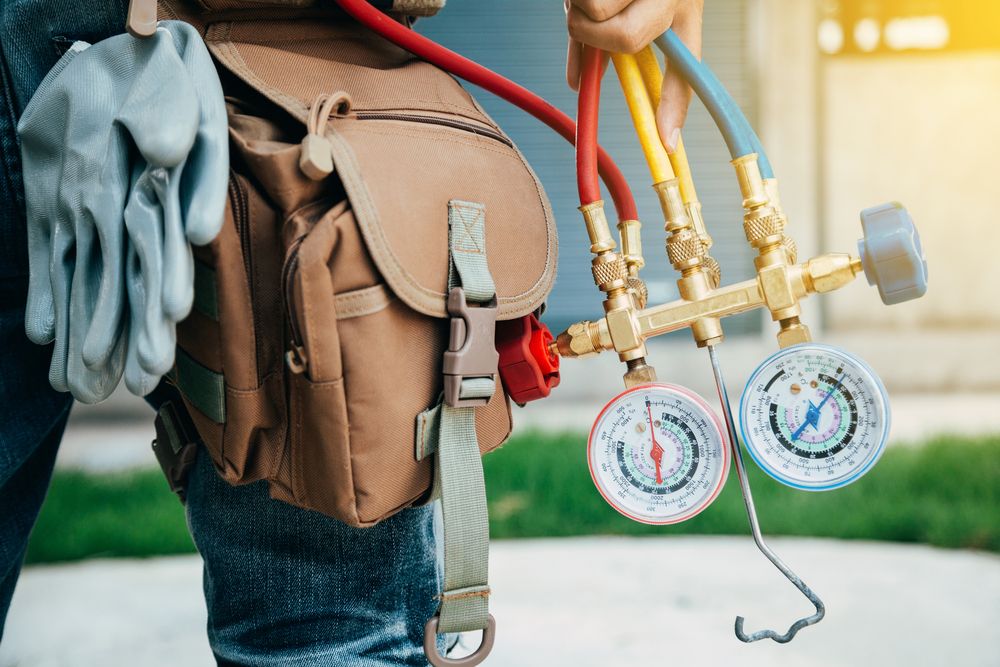Trust DMAKS HVAC for Reliable Heating and Cooling Support.
Wiki Article
Energy-Efficient A/c Solutions to Minimize Energy Costs
As energy expenses remain to climb, the importance of energy-efficient heating and cooling systems ends up being increasingly obvious. These systems not only assure substantial cost savings on utility costs but additionally contribute to a much more sustainable future by reducing power consumption. With various alternatives available, including geothermal heatpump and ductless mini-splits, residential property owners deal with a plethora of choices that can enhance convenience and air quality. Recognizing the essential features and maintenance requirements is essential to optimizing these advantages. What factors should be prioritized when picking the right system for your requirements?Benefits of Energy-Efficient A/c Systems
Energy-efficient heating and cooling systems provide numerous advantages that prolong beyond mere cost financial savings. One substantial advantage is the minimized environmental effect. By taking in less power, these systems add to decrease greenhouse gas exhausts, assisting to deal with climate adjustment and promote sustainability. This straightens with increasing social needs for eco-friendly techniques in residential and commercial settings.Furthermore, energy-efficient a/c systems commonly provide boosted convenience levels. A lot of these systems include advanced modern technology that permits better temperature level control and boosted air top quality (DMAKS HVAC). This results in a much healthier indoor atmosphere, which is specifically vital for individuals with allergic reactions or breathing concerns
Additionally, purchasing energy-efficient a/c systems can boost home value. As more customers focus on power performance, homes and buildings outfitted with these systems may bring in greater proposals in the genuine estate market.
Types of Energy-Efficient Heating And Cooling Options
Just how can home owners and businesses select one of the most ideal energy-efficient cooling and heating options for their demands? The marketplace provides a range of energy-efficient heating and cooling systems, each developed to improve convenience while decreasing energy consumption.One alternative is the variable cooling agent circulation (VRF) system, which effectively controls the temperature level in numerous areas within a building. This system adapts its refrigerant flow to match the desired temperature, bring about substantial power cost savings.
An additional popular choice is geothermal warmth pumps, which use the planet's stable temperature to warmth and awesome areas. By transferring heat to and from the ground, these systems demonstrate remarkable efficiency, especially in moderate climates.
Additionally, ductless mini-split systems supply an energy-efficient choice for homes doing not have ductwork. These systems enable zone-specific cooling and heating, lowering power waste in vacant locations.
Last but not least, high-efficiency heaters and air conditioning unit, with advanced SEER and AFUE ratings, use trusted environment control while taking in much less energy than typical models. By examining these options, house owners and businesses can select a cooling and heating system customized to their details needs and energy efficiency objectives.
Key Functions to Consider

Next, explore the sort of compressor used in the system. DMAKS HVAC. Variable-speed compressors can adjust their result to match the home heating or cooling need, resulting in improved convenience and energy cost savings contrasted to single-speed models. In addition, look for systems geared up with smart thermostats that provide programmable setups and remote accessibility, permitting much better control over power intake
An additional important function is the system's air purification capability. High-efficiency filters can improve indoor air high quality and minimize energy consumption by ensuring the system operates efficiently. Moreover, think about the type of refrigerant made use of; modern systems usually employ green cooling agents that have a reduced ecological effect.
Finally, make certain that the system is compatible with zoning innovation, which permits for tailored temperature control in various areas of your home, boosting comfort while decreasing energy usage.
Tips for Choosing the Right System


Following, think about power performance scores, specifically the Seasonal Energy Efficiency Proportion (SEER) for cooling systems and the Annual Fuel Use Efficiency (AFUE) for home heating systems. Higher ratings suggest better effectiveness, which can bring about considerable cost savings on utility expenses with time.
Furthermore, review the sort of a/c system that best matches your way of living and budget plan. Options include air conditioning, ductless mini-splits, and heatpump, each with its very own set of benefits and disadvantages.
Do not ignore the relevance of correct installation and sizing; an improperly sized system can bring about inefficiencies and enhanced wear. Last but not least, talk to Resources a specialist HVAC contractor to acquire expert recommendations tailored to your home's unique needs. This thorough approach will guarantee that you pick an energy-efficient heating and cooling system that meets your needs and budget properly.
Maintenance for Optimal Performance
Once the best HVAC system is in place, continuous upkeep comes to be crucial to ensuring ideal efficiency and long life. A well-kept system runs much more properly, leading to lower power intake and minimized utility costs. Regular evaluations and tune-ups should be arranged at least two times a year-- as soon as before the cooling season and when prior to the heating season.
House owners need to also be cautious concerning checking their HVAC system's performance. Uncommon noises, fluctuating temperatures, or boosted power expenses can show underlying issues that require immediate interest. By resolving these issues without delay, property owners can protect against costly repair services and expand the lifespan of their systems.
Purchasing an upkeep plan with a qualified professional not just enhances effectiveness yet also offers tranquility of mind, recognizing that the system is operating at its finest. DMAKS HVAC. Routine upkeep is consequently vital for maintaining power performance and reducing general operational costs
Verdict
Finally, energy-efficient heating and cooling systems present a sensible option for decreasing energy expenses while improving comfort and air top quality. Our site By integrating advanced innovations and choices such as geothermal heatpump and ductless mini-splits, homeowner can accomplish substantial energy savings and contribute to ecological sustainability. Mindful consideration of system functions and ongoing maintenance even more ensures ideal efficiency, making energy-efficient systems a sensible investment for both financial and ecological benefits.Report this wiki page